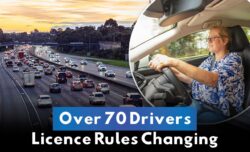Sleep in Car Australia Law – Sleeping in your car might seem like an easy solution for a long drive or an emergency stop, but in Australia, the 2025 laws have finally clarified when and where it’s actually legal. Each state and territory sets its own rules regarding overnight stays in vehicles, and while some local councils allow it in designated areas, others impose heavy fines for doing so in public spaces or residential streets. With updated road safety, parking, and camping regulations now in place, understanding the latest guidelines is crucial to avoid penalties while ensuring your safety.

2025 Vehicle Sleeping Rules by Australian States
As of 2025, sleeping in your car is not outright illegal in Australia, but it heavily depends on the location and state regulations. In New South Wales (NSW), Queensland, and Victoria, you can rest or nap in your car if it’s parked safely and not obstructing traffic. However, overnight stays in residential zones or near beaches may attract fines ranging from AUD $100 to $1,200. Western Australia and Tasmania are more lenient, especially in designated roadside rest areas, provided drivers follow time limits and safety rules. Always check signage and council rules before stopping for the night.
Also Check : Over-70 Aussie Drivers Alert
Legal Exceptions and Safe Parking Zones Explained
Certain areas across Australia now have marked “Rest Stop” and “Driver Reviver” zones where sleeping in your car is permitted. These are part of national road safety programs designed to prevent fatigue-related accidents. For example, long-distance travellers can safely pull over at highway rest points or petrol station parking lots. However, sleeping in shopping centre or residential driveways without permission can result in towing or fines. Always choose well-lit areas, avoid secluded zones, and ensure your vehicle is locked while you rest.
 Australians Shocked by New Super Rules – Early Access Limits & Tax Impacts Explained (Oct 2025)
Australians Shocked by New Super Rules – Early Access Limits & Tax Impacts Explained (Oct 2025)
Fines and Penalties for Illegal Car Sleeping in Australia
The 2025 updates clarified that penalties for illegal vehicle sleeping vary between local councils. In Victoria and NSW, fines can reach up to AUD $1,000 for violating no-camping or overnight parking restrictions. Queensland police may also issue warnings or infringement notices for drivers found intoxicated while inside parked vehicles, even if the engine is off. To stay compliant, avoid sleeping on public roads, near private properties, or near schools and playgrounds. Instead, use designated camping zones or paid caravan parks for safe overnight rest.
Check This Also : Flip-Flops and Fines
Tips for Sleeping Safely and Legally in Your Car
If you plan to sleep in your car, choose rest areas approved by Transport Australia or listed under the “Fatigue Zone” map available on government travel apps. Always park on flat ground, keep windows slightly open for ventilation, and store valuables out of sight. Carry essential items like a power bank, first aid kit, and blanket. For long road trips, plan your route with scheduled rest points. Remember, safety and legality go hand-in-hand — being informed keeps you secure and saves you from unexpected fines.
FAQs
1. Is it legal to sleep in your car in Australia in 2025?
Yes, but only in permitted areas such as rest stops or roadside fatigue zones.
2. Can I sleep in my car on the beach in NSW?
No, most NSW coastal councils prohibit overnight vehicle sleeping near beaches.
3. What happens if I’m caught sleeping in a no-parking zone?
You may face fines between AUD $100 to $1,000 depending on council rules.
 Over-70 Aussie Drivers Alert: Licence Rules Change from 10th October 2025 – What You Must Do
Over-70 Aussie Drivers Alert: Licence Rules Change from 10th October 2025 – What You Must Do
4. Can police fine me if I’m drunk but sleeping in my car?
Yes, if you’re intoxicated and in control of the vehicle, you can be charged under DUI laws.


